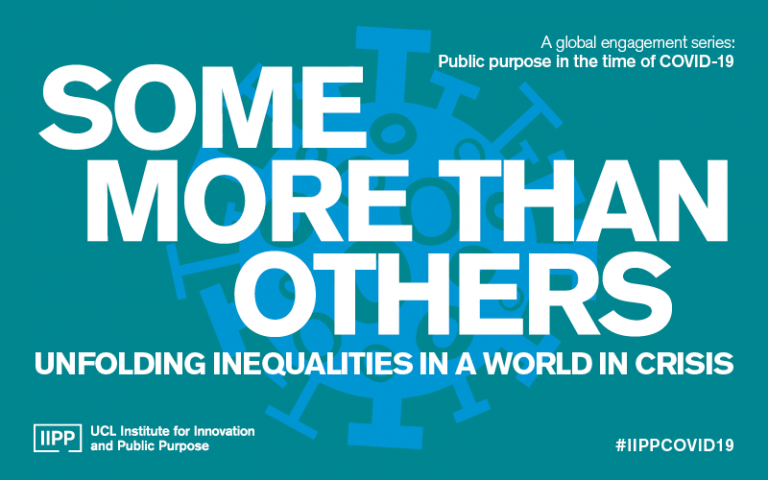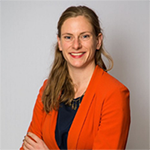
Join the Institute for Innovation and Public Purpose (IIPP) as we explore the ways in which COVID-19 has amplified existing national and global inequalities an investigate how policy responses address – or fail to address – the inequalities that are setting the course of the pandemic with leading experts Danny Dorling, Damon Silvers, William Spriggs and Kate Roll.
This event is free.
Event Information
Organiser
-
UCL Institute for Innovation and Public Purpose
Watch this talk
At the beginning of the pandemic, pop icon Madonna mused from the bath that COVID-19 “doesn’t care about how rich you are… where you live, how old you are”. But this does not appear to be the case. Rather, COVID-19 has followed established lines of disadvantage, disproportionately affecting those with less secure work, more crowded housing, and higher burdens of disease. This talk will explore the ways in which COVID-19 has amplified existing national and global inequalities and exposed new cleavages. It will investigate how policy responses address – or fail to address – the inequalities that are setting the course of the pandemic.
YouTube Widget Placeholderhttps://youtu.be/T9YFS6kVHoU
This event will be live-streamed via Zoom. Please sign up using the link above.
Please note there are limited virtual seats available for this event. We will also be live-streaming the event on YouTube, so please follow IIPP on Twitter @IIPP_UCL where we will be sharing the YouTube link on the day of the event if you are unable to register for a ticket.
A recording will be available to watch online after the live event.
A global engagement series: Public purpose in the time of COVID-19
Hosted by the UCL Institute for Innovation and Public Purpose (IIPP), this virtual events series will ask the questions: What is ‘public purpose’ in the time of a global pandemic? What is the role of the State in shaping a social and economic recovery with a new directionality? Throughout the series, IIPP will be in conversation with leading global thinkers on today’s most pressing challenges, from the macroeconomic policy response to the effectiveness of different public governance solutions and civic engagement experimentation.
This series will also explore how to give public purpose to powerful digital technologies and rebuild more resilient economic systems and institutions, as well as what is needed across emerging economies to avoid spiralling into more debt and inequality.
The current global COVID-19 crisis is a wake-up call for a new public purpose which works for a more inclusive and sustainable global society.
Follow the conversation at #IIPPCOVID19
More information about the series
About the Speakers
Danny Dorling
Halford Mackinder Professor of Geography at
University of Oxford
Danny Dorling is one of Britain’s leading geographers and has had a major influence on our understanding of inequality and poverty. His work has revealed the multidimensional aspects to inequality beyond simple income measures, especially those in housing, health, employment and education, and pioneered new cartographic methods for understanding how these play out over space and society. In 2018 he published Peak Inequality: Britain's ticking time bomb, a comprehensive collection of his work on inequality in contemporary Britain. He helped create the website www.worldmapper.org, a popular open access tool for visualising the uneven distribution of economic and social phenomena across the world. He is an Academician of the Academy of the Learned Societies in the Social Sciences and a former Honorary President of the Society of Cartographers. More about Danny Dorling
Damon Silvers
Policy Director and Special Counsel to the American Federation of Labor and Congress of Industrial Organizations (AFL-CIO)
Damon Silvers is a leading voice of the US labour movement. He joined the AFL-CIO in 1997 and directed their successful legal efforts to restore pensions after the Executive Life collapse and severance owed to workers after the Enron and WorldCom collapses. As Policy Director, he has pushed for financial and health protections for workers during the pandemic and argued that an effective response and recovery needs to change employment practices. Damon is a member of the Investor Advisory Committee of the Securities and Exchange Commission and the Public Company Accounting Oversight Board’s Investor Advisory Group. Between 2008 and 2011, he served as the deputy chair of the Congressional Oversight Panel for the Troubled Asset Relief Program (TARP). He is also Senior Fellow for the Roosevelt Institute and a Visiting Professor at IIPP. He is leading a Ford Foundation research project on how labour market dynamics shape the outcomes of public policy initiatives. @DamonSilvers | More about Damon Silvers
William Spriggs
Chief Economist to the AFL-CIO and Professor of Economics at
Howard University
William Spriggs is a renowned labour economist specialising in employment issues and Professor at Howard University. As Chief Economist to the AFL-CIO, he chairs the Economic Policy Working Group for the Trade Union Advisory Committee to the OECD and serves on the board of the National Bureau of Economic Research. Bill has a long history of promoting and shaping progressive policies, including during his time in the Obama administration (2009-2012) as assistant secretary for the Office of Policy at the U.S. Department of Labor. He has also held roles at the Department of Commerce, the Small Business Administration, and the Joint Economic Committee of the U.S. Congress. He is a former president of the National Economics Association, the organisation of America’s professional Black economists, and was recently celebrated by Fortune in a special Juneteenth edition as one of nineteen Black economists who are leading the profession. @WSpriggs | More about William Spriggs
Kate Roll (chair)
Assistant Professor in Innovation, Development and Value at
the UCL Institute for Innovation and Public Purpose (IIPP)
Kate Roll is a political scientist who works on understanding vulnerability and the factors that enable people in poverty to gain greater social and economic security. Her research has made substantial contributions to the academic fields around economies of peace, focusing on the politics of benefits programmes for former combatants, and on private sector approaches to development. Her current research examines the emerging paradigm of social innovation and 'technology for good’. She is committed to grounded research and has conducted in-depth fieldwork in Timor-Leste, Indonesia, the Philippines, and Kenya. Prior to joining IIPP, she was a faculty member at the University of Oxford’s Saïd Business School where she helped build the strategy and innovation curriculum and ran the Mutuality in Business Project, a large multi-year research partnership on responsible business. More about Kate Roll (chair)
Related Events





 Close
Close

